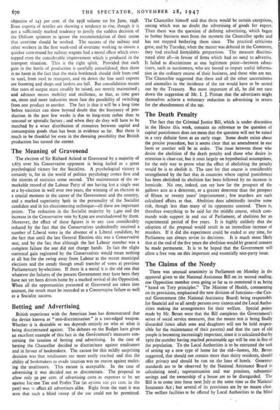The Meaning of Gravesend
The election of Sir Richard Acland at Gravesend by a majority of 1,675 over his Conservative opponent is being hailed as a great psychological victory for the Socialists. A psychological victory it certainly is, for in the world of politics psychology comes first and the niceties of statistics come second. The maintenance of the re- markable record of the Labour Party of not having lost a single seat at a by-election in well over two years, the winning of an election at a crucial moment in the career of the Government and the country, and a marked superiority b,oth in the personality of the Socialist candidate and in his electioneering technique—all these are important points. The reduction in the Socialist majority by 5,400 and the increase in the Conservative vote by 8,500 are overshadowed by them. Moreover, the effect of these figures is in any case considerably reduced by the fact that the Conservatives undoubtedly received a number of Liberal votes in the absence of a Liberal candidate, by the fact that until the last General Election this was a Conservative seat, and by the fact that although the last Labour member was a complete failure the seat did not change hands. In fact the slight statistical gain registered by the Conservatives would mean. nothing at all but for the swing away from Labour at the recent municipal elections and the steady though small transfer of votes at previous Parliamentary by-elections. If there is a moral it is the old one that whatever the failures of the present Government may have been they have not yet been driven home by a marked revival of the Opposition. When all the opportunities presented at Gravesend are taken into account, the result must be recorded as a Conservative failure as well as a Socialist success.




























 Previous page
Previous page